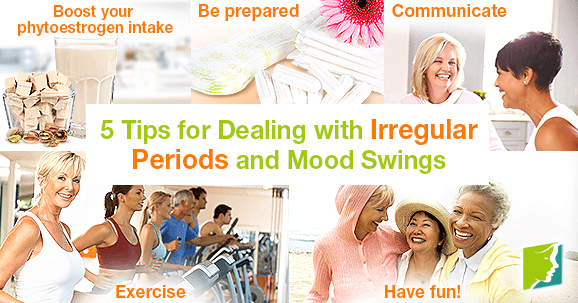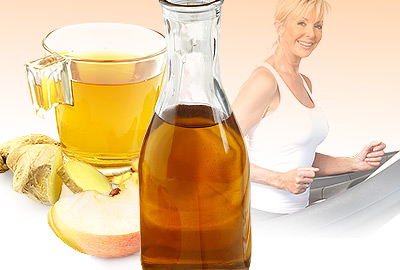The hormonal changes that occur in a woman's body as she approaches menopause can cause a number of physical and emotional changes; irregular periods and mood swings are among the most common of these. Frustratingly, the symptoms are mutually influencing: sporadic periods and heavy bleeding can invoke mood swings, and mood swings can cause stress and anxiety that may exacerbate menstrual irregularities. The effects of these symptoms may cause irritability and affect relationships, as well as undermining a woman's sense of well-being. Try these tips for dealing with them.
Boost Your Phytoestrogen Intake
Phytoestrogens are plant compounds that mimic the activity of estrogen in the body. This means that consuming phytoestrogenic sources - like tofu, soymilk, nuts, and seeds - will help increase estrogen levels. This can helpful since hormonal imbalances primarily cause both irregular periods and mood swings, as well as various other symptoms of menopause, including hot flashes and vaginal dryness. Herbal teas can also be used for this purpose; try black cohosh, dong quai, or red clover.
Be Prepared
Being prepared for the onset of irregular periods is a hands-on way of dealing with them. Be sure to carry around plenty of sanitary wear like tampons and sanitary towels, and find effective pain relief for cramps during heavy periods.
Communicate
Neither irregular periods nor mood swings are fun, and it's easy to take out irritability on those around you. Your family, friends, and colleagues are most likely to feel the brunt of your moods, and communication is key to prevent these relationships from suffering. Set aside time to talk to those affected; explain your symptoms, assure them that you'll try to refrain from taking it out on them where possible, and thank them for understanding and supporting you. Avoid alienating those close to you by instead making a conscious effort to show how much you appreciate them.
Exercise
Aerobic exercise could go a long way in relieving both irregular periods and mood swings during menopause. Distracting and pain-relieving, physical activity is useful for treating cramps during heavy periods. Exercise has also been found to release endorphins that boost mood, so it has even been advised as an effective way to treat mild to moderate depression.
Have Fun!
Designate at least one hour of every day to an activity that's entirely for your own pleasure. This might mean reading, going for a walk, catching up with a friend, or playing a musical instrument: whatever makes you happy. This will help balance mood swings and provide a distraction from painful, irregular periods while enhancing your sense of self and well-being.
Remember that, while these symptoms are unpleasant, they are temporary and will eventually pass. Try not to let irregular periods and mood swings get you down; making practical and positive changes to deal with them is a hands-on approach that will help you take control of your menopause experience rather than letting its symptoms inhibit your lifestyle.
Sources
- National Health Service UK. (2013). Periods, Irregular - Treatment. Retrieved May 29, 2014, from http://www.nhs.uk/Conditions/Periods-irregular/Pages/Treatment.aspx
- National Health Service UK. (2013). Pre-menstrual syndrome (PMS). Retrieved May 29, 2014, from http://www.nhs.uk/conditions/premenstrual-syndrome/Pages/Introduction.aspx
- National Institutes of Health. (2012). Breast - premenstrual tenderness and swelling: MedlinePlus Medical Encyclopedia. Retrieved May 29, 2014, from http://www.nlm.nih.gov/medlineplus/ency/article/003153.htm
- National Institutes of Health. (2014.) Menstruation. Retrieved May 29, 2014, from http://www.nlm.nih.gov/medlineplus/menstruation.html
- The Ohio State University (n.d.). Perimenopause. Retrieved May 29, 2014, from http://medicalcenter.osu.edu/patientcare/healthcare_services/womens_health/menopause/perimenopause/Pages/index.aspx




